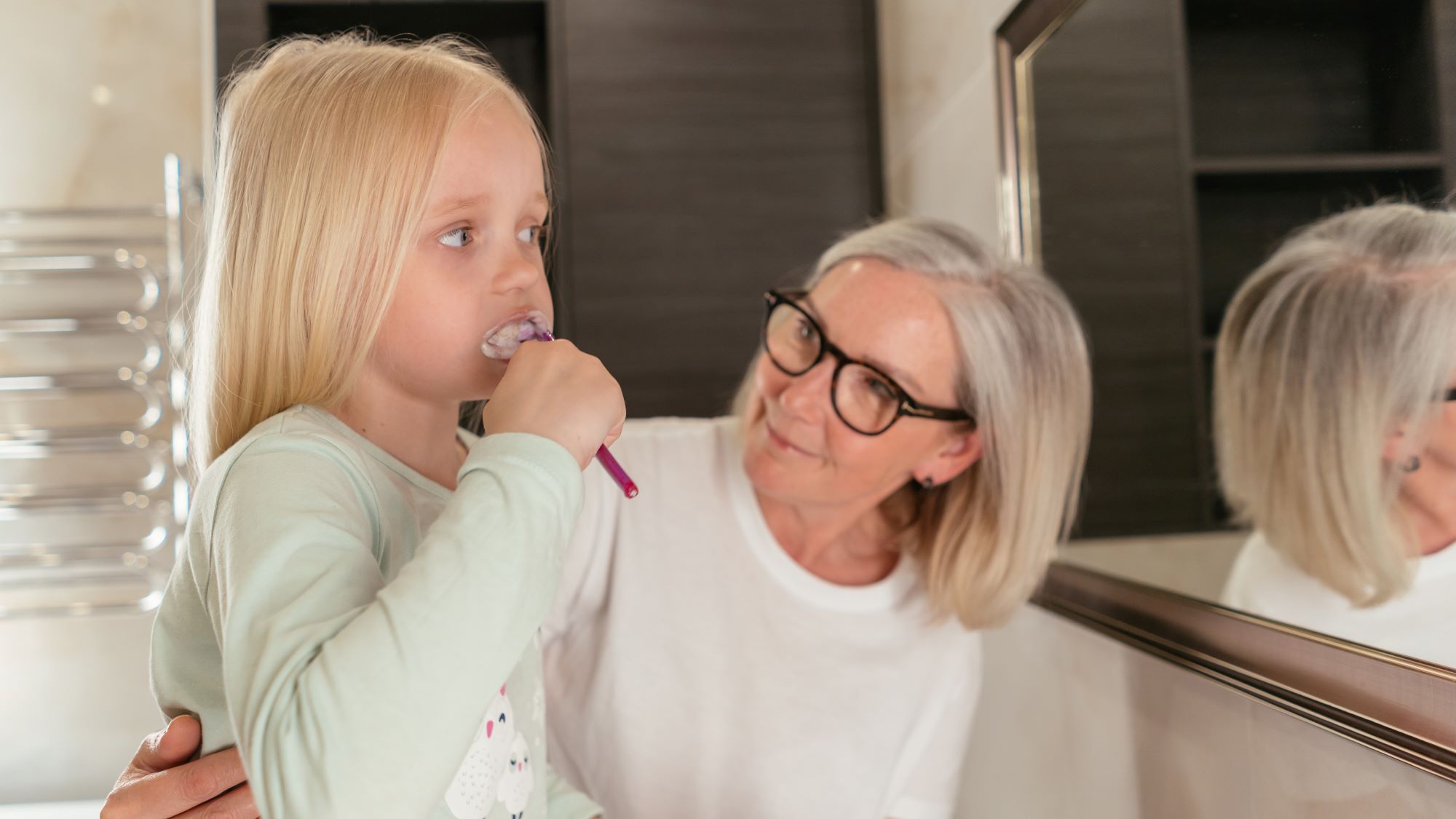
02 Apr When Should I Let My Child Start Handling Their Own Oral Hygiene?
If your child is what people call “strong-willed,” they might already fight you when you try to brush their teeth for them. They might launch a full-scale tantrum when you try to floss their teeth, protesting that they can “do it themselves” (even if they’re only three), leaving you to wonder whether you should just give in and let them.
Or maybe, you’ve been letting your son or daughter handle their own brushing and flossing for years without a second thought. They’re young, but they’ve got the hang of it!
Or perhaps, you’re a new parent with a kid who is quickly growing up, and you’re just not sure when you should trust them with the responsibility of their own oral health.
If you have kids, and they have teeth, this post is for you. Today, we’ll explore exactly when children are mature enough to handle their own oral health, and how best to optimize the whole transferring-ownership process.
Brushing
Often, kids are instructed to brush their teeth and sent off long before they have the ability to carry out that instruction well. While you may have the rare child who enjoys brushing his or her teeth and runs off to the bathroom, excited to use their personalized toothbrush, that doesn’t mean they’re doing a thorough job.
Let’s face it: most kids don’t like the taste of toothpaste, no matter how kid-friendly it might claim to be. This might lead a child to try and skip the toothpaste, or even find a way to skip brushing altogether. For young children who do brush, even with toothpaste, they still often lack the follow-through and dexterity to reach the back teeth, or the inward-facing sides of their teeth. These are tricky areas to get! For the young hands that are still learning things like gripping utensils and tying shoes, the dexterity required to navigate a toothbrush in that way is often too much, even if it seems on the surface like they’re doing a good job.
So, unfortunately, in light of this, there’s no magic date that suddenly declares your child able to brush his or her teeth alone. Some dentists identify the time frame between 6 and 9 years old as when children develop the dexterity, instruction-following-capability, and focus necessary to brush thoroughly, but this is not set in stone. An easy test you can apply to see whether your child is ready to brush by themselves or not is whether they can tie their own shoes. This is often an indicator of whether they have the fine motor skills needed to brush their teeth.
Flossing
It’s okay, you can say it out loud: flossing is not your favorite. Flossing isn’t really anybody’s favorite, but teaching our children from an early age that it is extremely important for dental health with set them up for success. Without a proper and regular habit of flossing, you are at a much higher risk for cavities, gum disease, and general decay. So yes, children must be trained over years and years into the habit of flossing, too. If you haven’t started the process yet, it’s not too late. It can start today.
Experts recommend flossing your child’s teeth for them as soon as they have two teeth that touch. This is usually between two and three years old. You may think that this sounds like overkill—they’re practically still babies, after all. But no tooth is safe from cavities, not even baby teeth! Once you have teeth, they’re subject to decay. Baby teeth need the same care and protection as adult teeth. Thus, flossing should start as soon as there are enough teeth to floss.
When are they old enough to floss on their own?
While you may have allowed your child brushing independence some time between 6 and 9 years old, flossing often takes a little longer. It’s hard! Like reaching those back molars or the inward faces of your teeth, flossing requires an extra level of fine motor skills that some kids just don’t have at 5, or 7, or even 9. Stanford Medicine states, “Children often need help with flossing until they are ages 8 to 10.”
In other words, don’t think that just because you let your child brush by themselves, they should be allowed to floss by themselves, too. Flossing is decidedly harder, and allowing a child who lacks the focus or fine motor skills needed to do the job could cost you in dental bills later.
Handing Over the Reins
Giving your child ownership over their own oral health is a key step on their way to maturity. It has to happen eventually, otherwise they’d be grownups, with their aging parents still coming over to brush their teeth for them! As you make the transition, however, here are just a couple of tips to keep in mind:
The Averages are Only Averages
Yes, it seems that most children are ready to brush independently between the ages of six and nine. Yes, it seems that most children can floss on their own between the ages of eight and ten. But the averages don’t tell the whole story. Remember that each child is unique. If you can see that at age ten, your son or daughter still isn’t getting the hang of flossing, you might just need to keep working with them til they get it. Listen to the advice of your dentist, and don’t assume that just because most children can brush or floss by a certain age that it means your child is ready.
Immediate and Long-Term Goals
It’s important to keep the situation in context, because there are really two goals you’re aiming for here.
In the long term, you want your child to establish solid oral hygiene habits. The goal is that your child would brush their teeth twice a day for two minutes at a time and floss thoroughly without ever skipping or needing to be reminded. Eventually, the goal is for your child to take ownership of their own dental health.
But in the short term, your goal needs to be healthy teeth. It’s probably pretty unrealistic to expect your daughter to take that kind of solid ownership over her own dental health if she’s only barely started kindergarten. Kids need help caring for the teeth, and they might need that help for quite some time.
As you can see, these goals might seem a bit difficult to reconcile on the surface. After all, if I keep constantly supervising my son or even brushing for him, even though he’s already eight, he’ll have healthy teeth… but how will he learn to establish solid oral hygiene habits without help? On the other hand, if I let my first grader floss her own teeth like she keeps trying to do, she’ll learn independence, but will the job really get done?
The right mindset
These are fair questions. What we would encourage you to keep in mind is that your child having healthy teeth now is what’s most important. As pediatric dentists would say, “They have plenty of time to learn and be independent, but right now, they need clean teeth.” Ideally, keeping up a consistent habit of brushing and flossing with your child will instill in them the message that this is important. That way, you’ll still be reaping both benefits: clean teeth in the present, and shaping healthy oral hygiene habits for the future.
If you need to schedule the next appointment for yourself or someone in your family, please contact us today. If you have questions about how best to care for your child’s teeth, please contact our office as well! We would love to speak with you.

About Our Team
Dr. McReynolds and our team at Augusta Family Dental have over 40 years of experience in the field of dentistry. We’re passionate about improving lives through better oral health as well as educating our patients.
Come see why we’re Athens, TN top choice for dentists!

Sorry, the comment form is closed at this time.